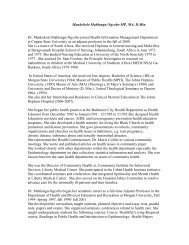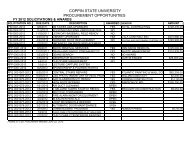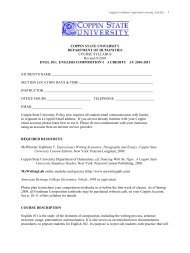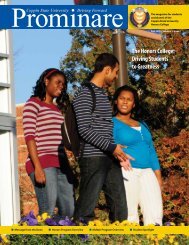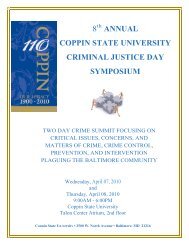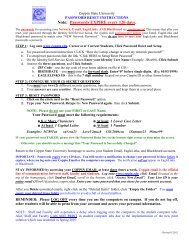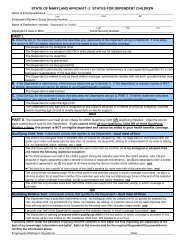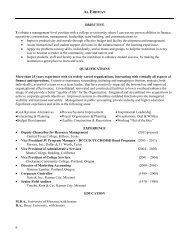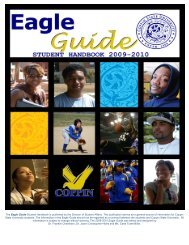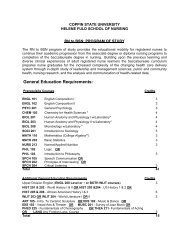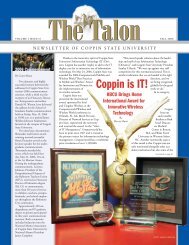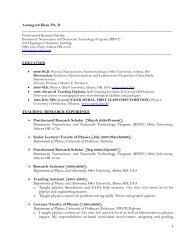Eagle Guide Student Handbook - Coppin State University Homepage
Eagle Guide Student Handbook - Coppin State University Homepage
Eagle Guide Student Handbook - Coppin State University Homepage
Create successful ePaper yourself
Turn your PDF publications into a flip-book with our unique Google optimized e-Paper software.
existence of the <strong>Student</strong> Code and of how such matters will be handled internally within the<br />
<strong>University</strong> community.<br />
d. The <strong>University</strong> will cooperate fully with law enforcement and other agencies in the enforcement<br />
of criminal law on campus and in the conditions imposed by criminal courts for the rehabilitation<br />
of student violators. Individual students and faculty members, acting in their personal capacities,<br />
remain free to interact with governmental representatives as they deem appropriate.<br />
ARTICLE V - JUDICIAL POLICIES<br />
A. CHARGES AND HEARINGS<br />
1. Any member of the <strong>University</strong> community may file charges against any student for misconduct<br />
under this Code. Charges shall be prepared in writing, and directed to the Judicial Advisor<br />
responsible for the administration of the <strong>University</strong> judicial system. Any charge should be<br />
submitted as soon as possible after the event takes place.<br />
2. The Judicial Advisor may conduct an investigation to determine if the charges have merit and/or if<br />
they can be disposed of administratively by mutual consent of the parties involved on a basis<br />
acceptable to the Judicial Advisor. Such disposition shall be final and there shall be no<br />
subsequent proceedings. If the charges cannot be disposed of by mutual consent, the Judicial<br />
Advisor may later serve in the same matter as the judicial body or a member thereof.<br />
3. All charges shall be presented to the accused student in written form. A time shall be set for a<br />
hearing, not less than five nor more than fifteen calendar days after the student has been notified.<br />
Maximum time limits for scheduling of hearing may be extended at the discretion of the Judicial<br />
Advisor.<br />
4. Hearings shall be conducted by a judicial body according to the following guidelines:<br />
a. Admission of any person other than the accused student, to the hearing shall be at the<br />
discretion of the judicial body and/or it’s Judicial Advisor.<br />
b. In hearings involving more than one accused student, the chairperson of the judicial<br />
body, in his or her discretion, may permit the hearings concerning each student to be<br />
conducted separately.<br />
c. The complainant and the accused have the right to be assisted by any advisor they<br />
choose, at their own expense. The advisor may be an attorney. Nevertheless, the<br />
complainant and/or the accused is responsible for presenting his or her own case by<br />
calling witnesses, cross-examining witnesses, presenting written documents and making<br />
opening and closing statements. An advisor present at a hearing before a judicial body is<br />
permitted to advise his or her client as to what, if any, statements should be made before<br />
the judicial body. However, an advisor is not permitted to cross-examine witnesses,<br />
present documentary evidence or make opening and closing statements.<br />
d. Pertinent records, exhibits, and written statements may be accepted as evidence for<br />
consideration by a judicial body at the discretion of the chairperson.<br />
74| P age



